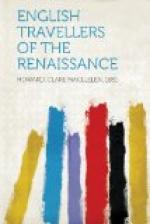may leade a more quiet and contented
life, to the glory of God.
b. Secondarily, regarding ends,
(i) Publicke.
(a) What persons are inhibited
travaile.
(1) Infants, Decrepite persons,
Fools, Women.
(b) What times to travaile in
are not fitte:
(2) When our country is
engaged in warres.
(c) Fitte.
(1) When one may reape
most profit in shortest
time, for that hee aimeth
at.
(2) When the country, into
which we would travaile,
holdeth not ours in jealousie,
etc.”
That the idea of travel as a duty to the State had permeated the Elizabethans from the courtier to the common sailor is borne out by contemporary letters of all sorts. Even William Bourne, an innkeeper at Gravesend, who wrote a hand-book of applied mathematics, called it The Treasure for Travellers[63] and prefaced it with an exhortation in the style of Turler. In the correspondence of Lord Burghley, Sir Philip Sidney, Fulke Greville, the Earl of Essex, and Secretary Davison, we see how seriously the aim of travel was inculcated. Here are the same reminders to have the welfare of the commonwealth constantly in mind, to waste no time, to use order and method in observation, and to bring home, if possible, valuable information. Sidney bewails how much he has missed for “want of having directed my course to the right end, and by the right means.” But he trusts his brother has imprinted on his mind “the scope and mark you mean by your pains to shoot at. Your purpose is, being a gentleman born, to furnish yourself with the knowledge of such things as may be serviceable to your country."[64]
Davison urges the value of experience, scorning the man who thinks to fit himself by books: “Our sedentary traveller may pass for a wise man as long as he converseth either with dead men by reading, or by writing, with men absent. But let him once enter on the stage of public employment, and he will soon find, if he can but be sensible of contempt, that he is unfit for action. For ability to treat with men of several humours, factions and countries; duly to comply with them, or stand off, as occasion shall require, is not gotten only by reading of books, but rather by studying of men: yet this is ever held true. The best scholar is fittest for a traveller, as being able to make the most useful observations: experience added to learning makes a perfect man."[65]




